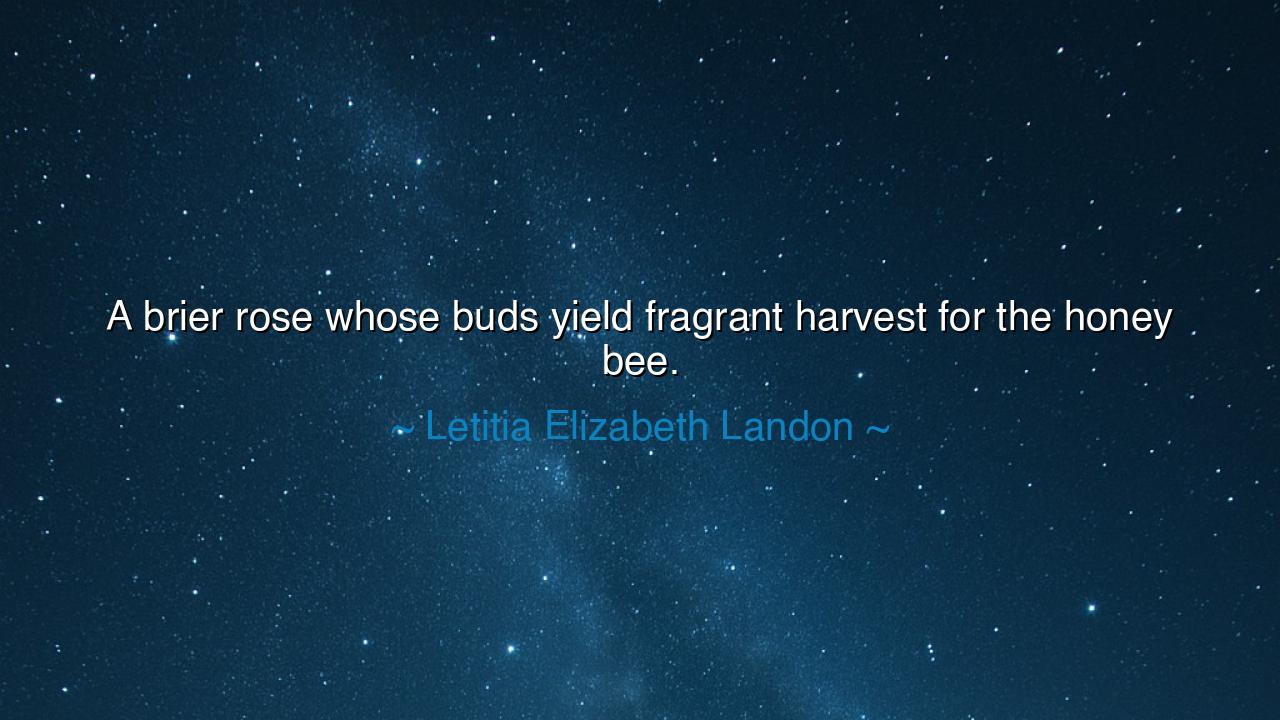
A brier rose whose buds yield fragrant harvest for the honey bee.






“A brier rose whose buds yield fragrant harvest for the honey bee.” Thus wrote Letitia Elizabeth Landon, the poetess of deep feeling and delicate vision, whose words often clothed truth in the garments of beauty. In this single line, she captures the mystery of creation, the interwoven nature of pain and sweetness, of thorns and fragrance, of giving and receiving. The brier rose, humble and wild, grows not in manicured gardens but in the open fields, along paths where few stop to admire it. Yet its buds hold fragrance — the invisible gift that sustains life itself, feeding the wandering honey bee that in turn carries life onward. It is a vision of the divine circle — of the beauty that endures despite hardship, and of the giving spirit that transforms struggle into grace.
The origin of this quote lies within the poetic world of the early nineteenth century, when Letitia Elizabeth Landon — known to her readers as “L.E.L.” — wrote verses filled with emotion, reflection, and tenderness. Her work was born in an age of restraint, where women’s voices were often confined, yet her pen dared to speak of love, suffering, and the heart’s truth. The brier rose she describes is more than a flower; it is her own reflection — a symbol of the artist’s soul, which blooms among thorns yet gives its beauty freely to the world. Like the rose, Landon’s poetry was delicate yet enduring, offering nourishment to the minds and hearts that sought its sweetness, even as she herself endured loneliness and sorrow.
To understand the brier rose, one must look upon it as nature’s paradox. Its stems bear thorns, its blooms are simple, and yet its fragrance rivals that of any cultivated flower. It asks for nothing — no gardener’s care, no wall to protect it from the wind — and yet it gives abundantly. So too are the souls of those who labor quietly in obscurity, whose lives seem small in the eyes of the world but whose kindness, art, or wisdom nourish others unseen. The honey bee, drawn to its sweetness, becomes the messenger of life — carrying pollen from flower to flower, spreading creation’s bounty. Thus the rose’s sacrifice — its openness, its fragility — becomes the source of growth for all. This is the eternal law of nature and of spirit: that in giving, we receive, and in yielding, we become fruitful.
Consider the story of Saint Thérèse of Lisieux, known as the “Little Flower.” Like the brier rose, she lived quietly, unseen by the great world, within the walls of her convent. Yet through her simplicity, her humility, and her constant love, she yielded a fragrant harvest that continues to nourish souls across generations. She called her way “the little way” — doing small things with great love. Thérèse did not seek fame or power; she bloomed in obscurity, and yet her fragrance filled the earth. Just as the brier rose gives its scent to the wandering bee, she gave her goodness to those who came near — and those small acts became seeds of holiness spread far and wide.
This image of the brier rose and the honey bee also speaks to the balance between pain and beauty, struggle and reward. The rose cannot grow without its thorns; the bee cannot live without labor. The thorns protect the flower, just as hardship refines the soul. The bee’s toil yields honey — the sweetest fruit of the hardest work. Landon’s rose thus becomes an emblem of resilience and purpose: that what is truly beautiful is not fragile, but enduring; not sheltered from life’s winds, but strengthened by them. The soul, like the rose, must face the sun and the storm alike, offering itself to both, for only then does its fragrance reach the world.
And yet, there is a gentleness in Landon’s words — a reverence for the ordinary. She reminds us that the sacred often wears a humble face. The brier rose does not seek to be admired; it simply is — beautiful in its simplicity, fruitful in its purpose. The honey bee does not take for itself alone; it labors for the hive, for the continuation of life itself. From this communion between the lowly and the noble, the fragrant and the tireless, Landon draws her vision of life: that we are each part of a greater harmony, and our quiet labors — though unseen — may be the very sweetness that sustains others.
Therefore, my child, take this wisdom to heart: be as the brier rose, content to grow where fate has planted you, and as the honey bee, diligent in your work. Do not despise the thorns that guard your beauty, for they are the signs of strength. Give of your gifts — your compassion, your words, your effort — even when few notice, for your fragrance will find its way into the world’s unseen corners. The simplest acts of care, the humblest offerings, may yield a harvest of sweetness beyond what you can imagine.
And remember always: greatness is not found in grandeur, but in giving. Like Letitia Elizabeth Landon’s rose, your life’s beauty will not be measured by how it is admired, but by how much it nourishes others. For every thorn that draws blood, there will be a bee that gathers honey — and from your trials, a fragrance that lingers long after you are gone.






AAdministratorAdministrator
Welcome, honored guests. Please leave a comment, we will respond soon